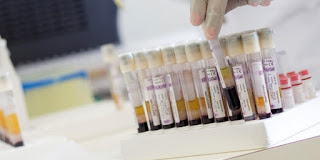We’re doing well but the battle goes on!
Dr Tshepo Sedibe, De Beers Group Senior
Occupational Health Manager,
reports on the progress being made in the fight
against HIV/AIDS
We
in De Beers Group are passionate about the health and wellbeing of our employees
and of the communities they come from. So we are determined to keep up the
fight against HIV/AIDS and tuberculosis (TB) among our people in southern
Africa.
Our
view is that the health of our workforce and their communities is interwoven.
By helping one, we help the other. Today – 1 December – is World AIDS Day, when
we come together to show our support for people living with the illness,
commemorate those who have lost their lives from it and rededicate ourselves to
the battle against HIV/AIDS.
As
background, AIDS stands for ‘acquired immune deficiency syndrome’, which
happens because of the damage to the immune system caused by HIV (human
immunodeficiency virus). It was first recognised in 1981 and the term AIDS
emerged in 1982.
Since
then, the world has made great progress. One might even be forgiven for
thinking that the battle is just about won. Sadly not. There are still major
challenges that demand that we sustain the fight towards our goals of zero new
cases of HIV, zero stigma, and zero deaths related to HIV.
 According
to the United Nations Programme on HIV/AIDS (UNAIDS), more than two million
people are newly infected with HIV annually, two thirds of whom live in
sub-Saharan Africa. De Beers Group has reported 58 new cases of HIV in 2018,
and regrettably five of our people lost their lives from HIV-related
conditions.
According
to the United Nations Programme on HIV/AIDS (UNAIDS), more than two million
people are newly infected with HIV annually, two thirds of whom live in
sub-Saharan Africa. De Beers Group has reported 58 new cases of HIV in 2018,
and regrettably five of our people lost their lives from HIV-related
conditions.
Only
a combination of behavioural and biomedical programmes and fresh approaches to
eliminating structural barriers will stop new HIV infections. We must continue
to work together to end the HIV epidemic. There has been remarkable success,
particularly over the past two decades, in reducing HIV associated mortality
and transmission, as well as the stigma attached to it, and in improving the
quality of life of people living with HIV.
As
treatment becomes more effective, more of our people are continuing to
contribute positively to their communities and to the company. Everyone
benefits, particularly the infected and the affected. De Beers Group is
committed to achieving the UNAIDS 90-90-90 targets and contributing to ending
the AIDS epidemic by 2030, and to backing the World Health Organization End TB
Strategy.
We
have more than 11,000 employees in southern Africa. By 2019, we expect to be
one of the region’s first organisations in which 90 per cent of our people will
know their HIV status, 90 per cent of employees diagnosed with an HIV infection
will receive sustained anti-retroviral therapy, and 90 per cent of employees
receiving that therapy will have viral suppression.
 In
2017, we launched a campaign in the company called ‘know your status’, actively
supported by top executives, with the aim of removing the stigma attached to
being tested for HIV. I am proud of the progress we have made. In our first
year of participation in the 90-90-90 programme in 2015, 26 per cent knew their
status. In 2018, it is well past 80 per cent.
In
2017, we launched a campaign in the company called ‘know your status’, actively
supported by top executives, with the aim of removing the stigma attached to
being tested for HIV. I am proud of the progress we have made. In our first
year of participation in the 90-90-90 programme in 2015, 26 per cent knew their
status. In 2018, it is well past 80 per cent.
We
in De Beers Group have shifted our focus towards prevention. A total of 91 per
cent of our people living with HIV have suppressed the virus, thus reducing the
risk of transmission. We are, of course, aiming for 100 per cent. Globally,
children aged up to 14 years accounted for 180,000 new HIV infections in 2017.
Our
HIV Disease Management Programme, launched in 2001, has reached 10 years of HIV
positive mothers giving birth to HIV negative babies, a vital contribution
towards protecting the future. In South Africa, that translated into delivering
456 pregnancies with HIV negative results. This is in keeping with our values
of ‘Shaping the future, and show we care’.
With
equal determination in the fight against HIV/AIDS, we are striding forward in
reducing TB. We offer all HIV positive employees prophylactic treatment to
protect them against TB. The incidence of it in our operations in Botswana,
Namibia and South Africa is lower than in the general mining industry, and in
our host countries.
We
have had no TB deaths since 2012 and we have cut the TB incidence to below 100
per 100,000 people in a region that generally reports 500-800 cases per 100,000
people. I see this as a commendable achievement, which demonstrates that our
efforts count.





Comments
Post a Comment